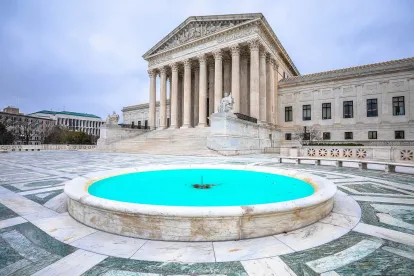The U.S. Supreme Court will decide whether the Securities and Exchange Commission’s (SEC) in-house enforcement proceedings violate the Constitution, teeing up a decision that could curtail securities law enforcement and broadly undermine the power of the entire administrative state.
The Supreme Court agreed last month to review a Fifth Circuit ruling that struck down the SEC’s administrative proceedings on numerous constitutional grounds. Were the Supreme Court to agree with the Fifth Circuit, its decision would upend administrative courts used by dozens of federal agencies, including the Federal Trade Commission (FTC), Department of Health and Human Services, and Social Security Administration.
“The adverse effects of the [Fifth Circuit’s] decision are not limited to the SEC,” the United States wrote in its petition for writ of certiorari. “The court’s . . . holdings cast a cloud over a host of federal statutes that empower agencies to conduct adjudications seeking civil penalties.”
The Fifth Circuit struck down the SEC’s in-house court in May 2022, basing its holding on the following three constitutional grounds:
The SEC’s ability to seek civil penalties in administrative proceedings deprives individuals of their right to a jury trial under the Seventh Amendment;
Congress violated the non-delegation doctrine by allowing the SEC to choose whether to bring its enforcement actions in its own administrative court or in a federal court; and
Congress violated Article II of the Constitution by granting for-cause removal protections to the SEC’s administrative law judges.
In its grant of certiorari, the Supreme Court agreed to hear arguments on each of these theories. The Court will likely issue its decision in summer 2024.
The case centers on hedge fund manager George Jarkesy, who allegedly overstated the value of his investment advisory firm Patriot28 LLC in the wake of the 2008 financial crisis. Instead of suing Jarkesy in federal court, the SEC opted to file an enforcement proceeding against him in its in-house court. Jarkesy lodged numerous constitutional challenges against this use of an administrative proceeding, but the D.C. Circuit held that it did not have jurisdiction to hear these constitutional arguments until after the completion of the SEC’s enforcement action. In 2020 — seven years after the SEC first filed its claims — an SEC administrative law judge ruled that Jarkesy committed securities fraud and ordered him to pay $300,000 in civil penalties and $685,000 in disgorgement. Jarkesy then re-filed his constitutional challenges in the Fifth Circuit.
This case is the latest in a decade-long attack on the constitutionality of SEC administrative proceedings. Detractors argue that these proceedings allow the SEC to act as the judge, jury, and prosecutor all at once.
The Supreme Court has incrementally reined in the SEC’s administrative power in recent years. The Court held in April that litigants subjected to SEC and FTC administrative proceedings can immediately file suit challenging the constitutionality of those proceedings — a ruling that would have benefited Jarkesy. Additionally, in 2018, the Court took issue with how the SEC appointed its administrative law judges.




 />i
/>i

